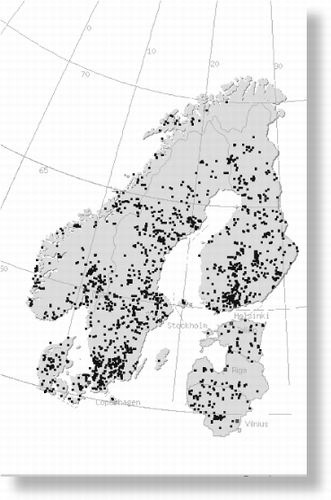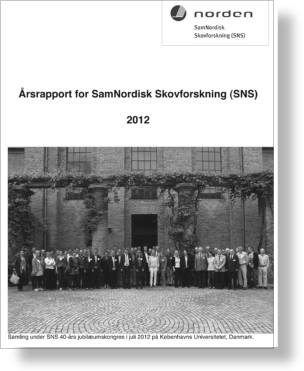
His Majesty King Carl XVI Gustaf opens the Commemorative Meeting in the Golden Hall in the Stockholm City Hall.
Two centuries in service of the green sector
Pomp and circumstance: a banquet at the Stockholm City Hall resembling the Nobel Prize dinner, a royal presence, a mass of prizes and online broadcasting. Stockholm was a place of feasting when the Royal Academy of Agriculture and Forestry celebrated its 200 year anniversary on January 28!
“Kongl. Svenska Landtbruks- Academien” was formally inaugurated on 28 January, 1813. The Academy has since been an important meeting place for the green sector.
His Majesty King Carl XVI Gustaf, HM Queen Silvia and more than 800 guests honoured the Academy with their presence at the commemorative meeting. The king opened the meeting with an address in honour of the occasion, which he closed by saying that our challenge is to provide the world's population with food, water and energy within sustainable limits, and that in doing this our hope is in science and experience.
Free and independent
The Academy is an economically free and independent networked organisation, working with issues relating to agriculture, horticulture, food, forestry and forest products, as well as fishing, hunting and aquaculture, the environment and natural resources. It is also a meeting place for people interested in agricultural and forest history.
Its independent position in society and its good name create opportunities for meetings and constructive discussions. The Academy has been the hub for many debates and projects related to forestry. Complex issues for which there is no complete picture are discussed and different solutions can be weighed against each other.
Seminars have always been important for summarising different viewpoints that are being debated in the forest sector, such as nature conservation, measures to increase biomass production, or restrictions with respect to water quality.
Forestry departemenrt
Forestry activities are drawn together in the forestry department of the Academy. Activities in the last fouryear period have focused on increased forest production, climate change, energy supply, the forestry value chain, reduced environmental impact and international forestry issues.
Ad hoc committees are formed to explore current topics. For example, the Committee for Silviculture analyses and evaluates the so-called “Swedish model” for integration of forest production and environmental concerns. The committee will deliver its recommendations in 2013.
Read more about the Academy on www.ksla.se
New SNS's projects
Four new projects starting in 2013 were granted funding by SNS at their board meeting in November 2012.”
Tailored wood fibre modification with oxidative enzymes
Forest-based raw materials have a central role in the new bioeconomy. To date, much attention has been focused on the conversion of wood to renewable energy. Another important area is fibre engineering and the production of new biomaterials. Regenerated cellulose for films and fibres is a growing market, and could replace cotton-based materials in textiles. Another innovative application is the production of nano-fibres from wood pulp, to be used in novel papers, films, composites, gels and foams. A third growing field concerns fibrebased packing materials, which could possess different properties, e.g. due to the application of innovative enzyme technologies.
The SNS-supported project will capitalise on recent findings relating to oxidative enzymes. Intense research on second-generation biofuels has shown that nature has an arsenal of oxidative enzymes that offer opportunities for the selective modification of cellulose and cellulose composites. Quite remarkably, carbohydrate oxidising enzymes have, until now, been almost completely ignored as tools for fibre engineering and activation, despite their obvious potential.
The aim of the project is to bring together expertise and ongoing projects to create a platform for novel sustainable enzyme-based oxidation techniques for the controlled modification of wood-derived fibres. The polymer and fibre surfacemodifying activity of the enzymes will be tested using various substrates such as celluloses and hemicelluloses from biorefinery processes, as well as conventional chemical and mechanical pulp fibres from hard- and softwoods.
The industrial interest in cellulosebased nano-particles and nanofibres is enormous. The project will establish proof-of-concepts for a range of applications that may be pursued in follow-up joint research projects.
The project runs for the period 2013–2015. Partners are Prof. Vincent Eijsink (coordinator), Norwegian University of Life Sciences; Prof. Claus Felby, University of Copenhagen; Prof. Maija Tenkanen, University of Helsinki.
Project title: SNS-116 Exploring novel oxidative biocatalysts for tailored wood fibre modification.
Contact: [email protected]
Workshop on bio-based economy
Advancing towards a bioeconomy involves economic and policy challenges such as designing appropriate regulations, stimulating information exchange, getting the incentives right, and supporting knowledge development. The private sector must, for its part, support innovation of green products and develop new competitive and sustainable business concepts. This requires a better understanding of how policies and market forces shape conditions for the bioeconomy. The economic and political sciences can advance insights into these kinds of relationships, and consequently contribute to the adaptation of the forest sector to a bioeconomy
This SNS-supported project will arrange a Nordic workshop to stimulate dialogue on the topic. The purpose is to present a conceptual framework of how the bioeconomy idea applies to the forest sector in the Nordic countries. Subsequently, it will reflect the latest economic and policy research related to the forest bioeconomy from a Nordic perspective and identify important non-technical issues that will strengthen the forest sector and increase its contribution to a bioeconomy
The Nordic workshop will be held in Uppsala on 28–29 August 2013. High quality conceptual papers from the workshop will be published in a special issue of Scandinavian Journal of Forest Research.
The project SNS-115 “The Nordic forest sector in the bio-based economy – challenges for political science and economics” is coordinated by Prof. Anders Roos, Swedish University of Agricultural Sciences. Other partners represent Denmark, Norway and FInland.
Contact: [email protected]
Startup of the SNS-115 project at a meeting in Uppsala. Photo: Mats Hannerz
Preventing forest damage from Phytophthora diseases
During the last century, epidemics of pathogens from the genus Phytophthora destroyed forest ecosystems worldwide, causing both enormous economic losses and significant ecological damage. Phytophthoras are especially unpredictable due to their inherent capacity to adapt rapidly and change behaviour. There is a strong association between the worldwide spread of these pathogens and plant trade via nurseries.
A species of particular concern for Nordic forests is Phytophthora ramorum, which damages Larix kaempferi in the UK and is also found on Vaccinium myrtillus in Norway. Two other species, P. plurivora and P. pini, encountered in Finnish nurseries, have been found to be highly pathogenic to Picea abies. It is suspected that P. plurivora, together with P. cactorum, is responsible for the recent disease observed on Fagus sylvatica in South Sweden. Another species, P. alni, is infecting Alnus species along the rivers on the west coast of Sweden, thus threatening riparian ecosystems. Moreover, in neighbouring countries Phytophtoras have been shown to increase mortality of dieback-infected ash both in nurseries and in forest stands.
Consequently, Phytophthora diseases pose an emerging threat for forests in North Europe. On the other hand, as the pathogens mainly originate from forest nurseries and are transferred to forests via infected plant material, this provides an opportunity for disease prevention and restoration of infested sites. However, in order to do this, the identity of the pathogens and their distribution must be known.
This SNS-supported project aims to determine the identity and distribution of Phytophtoras in key pathosystems, and to elucidate preventive and restoration measures.
The 3-year project (2013–2015) is a co-operation between Finland, Sweden, Norway, Latvia and Estonia. The main applicants are Prof. Jan Stenlid, Swedish University of Agricultural Sciences, Dr Arja Lilja, Finnish Forest Research Institute, and Prof. Halvor Solheim, Norwegian Forest and Landscape Institute.
Project name: SNS-117 Preventive and restorative measures to reduce damage on forests – Phytophtora diseases in focus. The project interacts with the SNS-EFINORD financed Nordic and North-European network Phytophtora diseases of forest trees.
Contact: [email protected]
Ecological effects of forest biomass harvesting
In conventional timber harvesting, branches, tops and stumps are left in the forests. Removal of these tree parts for bioenergy may have ecological consequences. Because a large proportion of the nutrients in trees are located in the needles and branches, removing these will reduce nutrient supplies to the soil. In the long term, this might increase the risk of both nutrient imbalances and reduced forest production and also affect biodiversity by changing species composition.
However, field experiments have produced contrasting results with respect to both soil chemistry and ground vegetation. We need more information about which factors determine the variation, and how these factors affect long-term site sustainability.
In the Nordic and Baltic countries, much work has already been done on these problems, and further integration of existing knowledge has the potential to increase greatly our understanding of the mechanisms responsible.
The SNS-supported project will compile available Nordic and Baltic data on experiments and published results on the effects of forest biomass harvesting on soil nutrient stores, soil carbon stocks, soil, surface and ground water, and biodiversity, and may add more data to existing databases (e.g. Noltfox and SilvaBoreal).
The project runs from 2013–2014 and is a cooperation between Norway, Denmark, Finland, Iceland, Lithuania, Latvia and Sweden. The project leader is Dr Nicholas Clarke, Norwegian Forest and Landscape Institute.
Project name: SNS-118 Ecological effects of intensive biomass harvesting in the Nordic and Baltic countries. Contact: [email protected]

Noltfox database on long-term forest experiments represent one important input to the project. Each pixel represents trials with Norway spruce.
Make your voice heard – blog in NB Forest
Do you wish to communicate your ideas or research results to a broader audience, without going through the laborious process of scientific publication? The NB Forest site has a blog section which will strive to be an arena for debate and information for the forest community in northern Europe.
NB Forest is a regional information and communication portal on forest research in the Nordic and Baltic region, and is run in co-operation between SNS and EFINORD.
The bloggers are recruited among highly qualified researchers and forest stakeholders, but voluntary contributions are more than welcome.
The blogs can be provocative to stimulate debate, as long as they are written within common rules of ethics and legal constraints.
“The blog section is a unique opportunity for contributors to start discussions and share ideas among the northern European forest community. And also within an unconventional framework”, says Mika Mustonen at EFINORD.
Blogs are published on www.nbforest.info/blog
Those interested in contributing can contact blog editor Mats Hannerz [email protected]
“If I feel that I have something to say, but don't want to make a big fuss about it, I write a blog.”
Alexander Stubb, Finland's minister of European affairs and foreign trade
SNS in 2012 figures from the annual report
| • | Networks – 1.0 million DKK | ||||
| • | Projects – 1.2 million DKK | ||||
| • | CARs – 1.6 million DKK | ||||
| • | Turnover - 5.6 million DKK | ||||
| • | 40-year anniversary conference | ||||
| • | External evaluation | ||||
| • | Intensified cooperation with EFINORD | ||||

Find more about SNS activities in the 2012 annual report on www.nordicforestresearch.org
EFI celebrates 20 years
EFI started its activities in 1993 and, since then, has evolved into a vibrant and dynamic international organisation.
The 20-year anniversary will be celebrated at the EFI annual conference from 23–27 September 2013 in Nancy, France.
The meeting is intended to stimulate a balanced discussion between policy/ decision makers, stakeholders and scientists on concrete issues related to the future of our forests, and the risks and opportunities they face.
Read more at www.efi20.efi.int
ABOUT EFI
| • | European Forest Institute is an international organisation, established by European States. | ||||
| • | 24 European States have ratified the Convention on EFI. | ||||
| • | EFI has 132 Associate and Affiliate Member organisations in 36 countries, five Regional Offices and one Project Centre. | ||||
| • | The headquarters are in Joensuu, Finland and the Policy Support office is located in Barcelona, Spain. | ||||
